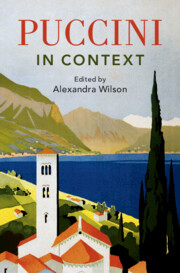Book contents
- Puccini in Context
- Composers in Context
- Puccini in Context
- Copyright page
- Contents
- Figures
- Table
- Notes on Contributors
- Preface
- Part I Formative Influences
- Part II Puccini’s Places
- Part III Influences and Interests
- Part IV Bringing Puccini to the Stage
- Part V Image and Reputation
- Part VI Puccini through a Political Lens
- Part VII Interpreting Puccini
- Part VIII Legacy
- Chapter 30 Puccini’s Legacy, Influence, and Meaning
- Chapter 31 Puccini in Popular Culture
- Chapter 32 Puccini and the Canon
- Bibliography
- Index
Chapter 30 - Puccini’s Legacy, Influence, and Meaning
from Part VIII - Legacy
Published online by Cambridge University Press: 31 August 2023
- Puccini in Context
- Composers in Context
- Puccini in Context
- Copyright page
- Contents
- Figures
- Table
- Notes on Contributors
- Preface
- Part I Formative Influences
- Part II Puccini’s Places
- Part III Influences and Interests
- Part IV Bringing Puccini to the Stage
- Part V Image and Reputation
- Part VI Puccini through a Political Lens
- Part VII Interpreting Puccini
- Part VIII Legacy
- Chapter 30 Puccini’s Legacy, Influence, and Meaning
- Chapter 31 Puccini in Popular Culture
- Chapter 32 Puccini and the Canon
- Bibliography
- Index
Summary
This chapter opens with a consideration of the parallels in the careers of Puccini and Rachmaninoff, both disparaged as conservative throwbacks to an earlier era and purveyors of a cloying sentimentality who reached larger audiences than any of their contemporaries. The author shows, however, that these stereotypes have been reconsidered in recent years, before proceeding to consider Puccini’s influence on the composers who followed him, including both composers of art music and the creators of mid-twentieth-century musical theatre. He argues that Puccini’s works came to be seen as having established the dominant rhetorical conventions of how music expresses human emotion, and argues that in Puccini’s hands, music rather than text becomes the primary driver of storytelling (an approach the author contrasts with that of Richard Strauss). The emotions in Puccini’s works have a universality to them, which has been a key factor in their global success. The author argues, however, that Puccini’s hegemony is now under threat, partly because contemporary popular music now diverges so sharply from the classical tradition and partly because the idea of universal human emotions and experience is being challenged in an era of identity politics.
- Type
- Chapter
- Information
- Puccini in Context , pp. 247 - 255Publisher: Cambridge University PressPrint publication year: 2023



